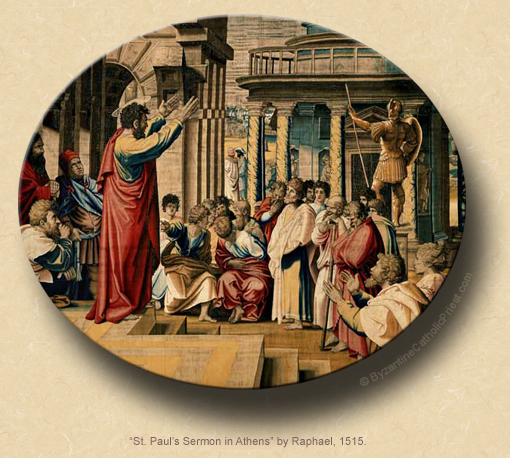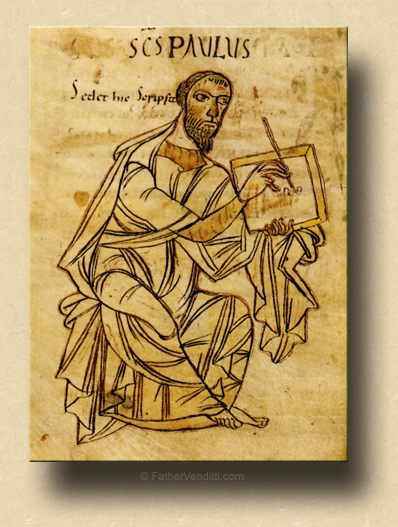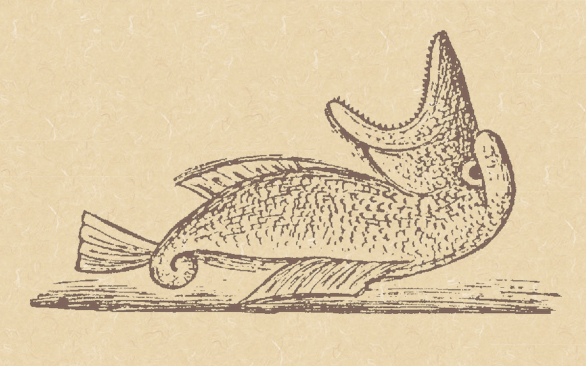Let God Do It.
The Fifth Sunday of Ordinary Time.
Lessons from the primary dominica, according to the ordinary form of the Roman Rite:
• Isaiah 58: 7-10.
• Psalm 112: 4-9.
• I Corinthians 2: 1-5.
• Matthew 5: 13-16.
Septuagesima Sunday.*
Lessons from the dominica, according to the extraordinary form of the Roman Rite:
• I Corinthians 9: 24-27; 10: 1-5.
• [Gradual] Psalm Psalm 9: 1-11, 19-20.
• [Tract] Psalm 129: 1-4.
• Matthew 20: 1-16.
FatherVenditti.com
|
7:02 PM 2/9/2020 — Our Gospel lesson today from Matthew chapter five is simple and straight-forward, the upshot being that Christ expects us to bear witness to our faith, not simply keep it to ourselves. The metaphors our Lord uses are as familiar to us as any verses in the Bible: the light of the world, the salt of the earth. What good is a lamp that’s hidden under a basket? What good is salt which has lost its flavor? All of us are called by God to be missionary disciples.
But I would like to do something a little bit different today and focus our attention on our Apostolic lesson from First Corinthians, and it requires a little background. This letter spawns from the Blessed Apostle Paul’s second missionary journey through Greece. Paul had dropped off his friend Timothy in Ephesus to be the new bishop there, then continued on into Macedonia where he receives a vision from the Lord asking him to take the Gospel into Greece. He goes to Philippi, to Thessalonica, to Athens; he basically fails in all of these places except for a few converts here and there, and later writes letters to them which are preserved for us in the New Testament, with the exception of Athens, with his activities there being recorded by Saint Luke in the Acts of the Apostles. Athens was a particularly bitter disappointment for him, as he was hoping to appeal to the Athenian’s love of philosophy;  but he was too clever for his own good. So, he's all depressed and dejected about this when he first sets his eyes on the great city of Corinth. He clearly had learned his lesson, which is why, in the lesson we just heard, he goes on about not trying to be sublime but have a faith based, not on worldly wisdom, but on the power of God alone. but he was too clever for his own good. So, he's all depressed and dejected about this when he first sets his eyes on the great city of Corinth. He clearly had learned his lesson, which is why, in the lesson we just heard, he goes on about not trying to be sublime but have a faith based, not on worldly wisdom, but on the power of God alone.
Corinth was already a very old city when he arrives there, founded as early as the nineteenth century before Christ. In the days of Socrates it was known as the Doric city, filled with museums and works of art; that is until the Romans stumbled upon it and decided that it just wasn't Roman enough to suit them, so they set about to improve the décor in the only way they knew how: by burning it to the ground. A century later, around 44 BC, it was rebuilt by Julius Caesar as a military outpost, and he colonized it with Italians. Over the next one hundred years, it grew again to become the leading commercial and political center of Greece, and this is around the time that the Blessed Apostle Paul first sets foot in it.
Now, to understand Paul's activities in Corinth, we have to understand something of what this city had become. Athens, of course, was the capitol of Greece, as you know, and it never did cease to be the intellectual and cultural center of that country, but its political influence was waning in the face of Roman expansion; so, that role began to be assumed more and more by Corinth. And while the old Doric city that Socrates would have known was probably one of the most beautiful in the world, the new Corinth was a cesspool by comparison. It had all the political and commercial influence of the old Athens, but none of the culture. It was Athens without the statues and the poetry; kind of like Washington, DC, with all the politics but none of the monuments. You've heard the expression, “A nice place to visit, but I wouldn't want to live there”? Well, Corinth wasn't even a nice place to visit. Nobody wanted to go to Corinth; you went there because it was the biggest seaport in the world; and, if you were involved in any kind of mercantile trade at all, and wanted a piece of the action, you had to be there. Its debauchery had even become part of the popular lexicon: the phrase “to live like a Corinthian” was slang for someone who lived an immoral life, and prostitutes were often referred to as “Corinthian girls.”
When Paul enters Corinth, with all of its debauchery and corruption and immorality, he has little reason to suppose that he will have any more success than he had anywhere else along the way;—in Philippi, in Thessalonica, in Berœa (which was another place he was chased out of), and particularly in Athens—and yet, by time he leaves there in the summer or fall of the year 52, it is the largest, most flourishing, and most active of all the Churches he established, even to the point of sending out missionaries of its own to spread the Gospel throughout cities all over Greece. We can't estimate how many Christians Paul left behind in Corinth, but we do know that they were from every nationality on the map, and some of them he mentions by name: Tertius was a Roman; Erastus was a Greek; Crispus was Jew.  Most of them were from the lower classes, but there were some wealthy merchants as well; and, all of them, so Paul himself testifies, were fervent, eager, and richly blessed with the gifts of the Holy Spirit. Most of them were from the lower classes, but there were some wealthy merchants as well; and, all of them, so Paul himself testifies, were fervent, eager, and richly blessed with the gifts of the Holy Spirit.
I remember having a conversation with a younger priest who was discouraged about what he perceived to be his failure to reach the souls of the people of his parish, and I had a hard time getting through to him because it's the kind of lesson you learn only after years of experience, which he didn't have: you leave a parish behind after being replaced by someone else, thinking that you've been a failure, only to learn years later that the seeds of Grace you planted there have borne fruit; you just weren't there to see it. And it's just as true for all of us: we may think that we've failed to reach our child who can't stay out of trouble, or that relative who won't talk to us, or the friend or neighbor that we crossed the wrong way, or anyone that we've tried to bring back to some semblance of Christian living. We may not see the change take place, but that doesn't mean what we tried to do was worthless.
One of the frustrations we face in our quest to follow our Lord is the sense that we all have at times, that we're not making any progress. We suffer the same struggles over and over again, we confess the same sins time and again, and we think that nothing we can do will change it. But we are not the ones to judge that. No effort we make to reproduce the Gospel, either in ourselves or in others, is ever wasted. Every effort, every struggle, brings Grace. We're not exactly objective when viewing ourselves, so we don't see it. In this sense, we could say that Saint Paul needed to heed the advice he had given to Timothy: to stop looking into himself and instead trust our Lord to do the work.
Contemplating Paul’s experience in Greece, we might find it advantageous to add an item to our examination of conscience: after listing all the sins we need to address, we might consider to what extent we're willing to let God handle them for us. Remember how the Prodigal Son had a whole speech rehearsed for his father about how it was all his fault, but his father didn't let him finish the speech because he had already forgiven him.
I'll leave you, then, with a thought about this by that great Father of the Church, Saint Ignatius of Antioch. Reflecting on Saint Paul's experiences, he said:
The Lord overlooks nothing. Even secrets are open to Him. Let us then do everything as if He were dwelling in us. Thus we shall be His temples, and He will be within us as our God—as He actually is (On the Letter to the Ephesians).

* In the extraordinary form of the Roman Rite, today is the first day of the pre-Lenten season known as Septuagesima, named after the first of the three Sundays that comprise it. The purple of Lent is already worn, and the Gradual psalm is supplimented by an additional psalm called the Tract, with the Alleluia already suppressed. In English speaking countries, this season is sometimes called “Shrovetide,” because it ends on the Tuesday before Ash Wednesday, which is often called “Shove Tuesday.” A pre-Lenten season is preserved in every Christian Church that has a serious liturgical tradition, even the more traditional brands of the Anglican and Lutheran communions; in the Churches of the Byzantine Tradition, it's called the Triodion. It was eliminated in the ordinary form of the Roman Rite during the reforms following the Second Vatican Council, making the ordinary from the only major liturgical tradition not to observe it in some way.
|

